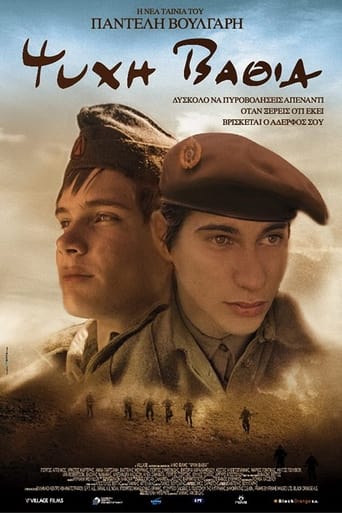giorts
The movie tries to portray all the suffering and pain that a civil war brings. At times the emotions are high, especially in after-battle scenes. The director tries to focus on both parties (maybe with a a little left-party bias).. Overall the movie succeeds in creating an engaging atmosphere although some scenes seem a bit rushed and unclear (towards the end).Definitely worth watching,
Ishkandar Raskolnick
One being familiar with the –in many aspects- minute Greek cinema can't possibly ignore a new film by Pantelis Voulgaris, a predominant figure in the Modern Greek Cinematography. "Psihi Vathia" i.e. "Deep (Courageous) Soul", is a film about two brothers finding themselves in opposite sides during the Greek civil war which, by the way, left ineradicable marks in the modern Greek history as well as in the modern Greek mythology, a civil war that followed the end of WWII. Voulgaris has been accused by some critics that in his honest effort to propose his own version of reconciliation (good guys and bad guys are in both sides) he finds himself trapped in a swamp of melodrama… Personally, I agree that the accusation is fair. Remember the young soldier dying with his mind and last thought in his 40 drachmas' debt (!!!). The battle scenes are perhaps more that what Voulgaris' budget could afford but there is some beautiful woods cinematography which, indeed, does not save the day. Some tried to compare "Psihi Vathia" with "El laberinto del fauno" by Guillermo del Toro . An unfortunate comparison, because, sadly,Voulgaris this time does not manage –as he did with his wonderful but underrated "Nyfes" (Brides)- to score
d-apergis
Given the seriousness of the subject-matter about a period that has left an indelible mark in Greek history and bearing Pantelis Voulgaris's strong directorial credentials in mind, it's astonishing to come across a movie as shallow as this. The main plot about two brothers fighting in opposite sides in Greek Civil War is contrived and unconvincing, and when the movie loses its footing it simply resorts to lyricism flatly deploring the effects of civil war. Psyhi Vathia, in its inability to decide what it wants to be or how it should say what it wants to say, loses any real interest in politics as well and it is finally reduced to a rather naive statement of patriotism depriving the audience of a thorough and credible insight at the machinations that brought this war. A few good battle scenes and beautiful woods cinematography do not save the day.
misel982001
This is the story of two brothers, Anestis and Vlasis who fight in two different camps during the Greek civil war. The story takes place in 1949, the last year of the war and probably the year that the most ferocious battles took place between the guerrillas and the Greek Army. In this story the two brothers(who are not even adults) have to face their worst fear:Losing each other. While the story evolves, the audience can see the most realistic to date, images of this brutal war who cost the lives of 70.000 soldiers on both sides and resulted in the immigration of over 500.000 non combatants.In this movie, almost everything seem realistic: Directing is great and the actors have been selected with great caution in order their appearance, voice and acting style fits almost perfectly with their roles. The director uses technics that make the audience feel that it is near the battlefield.The music that is used creates a realistic and depressing atmosphere that represents this period of great misery and pain. Another important feature of this film is that the story is being told from a neutral side: Since in this war there was no true winner and both armies were Greek, the director gives us each side's view. We will have an insight of what the Greek Army soldiers say and feel along with their rival guerrilla soldiers.Concluding, by all means this is probably one of the best Greek movies of all time and most likely the best of the last decade. Besides subjective objections that everyone of us has when watching a movie, as a whole this war drama surpasses even the equivalent movies of the 1960s and 1970s era and proves that Greek cinema has still things to give.



